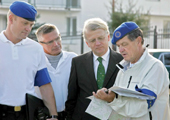New deaths before Geneva talks
By Temuri Kiguradze
Tuesday, November 18

The Plavi blast followed the death of a Georgian policeman in Pakhlavani village, near the other breakaway region, Abkhazia, on November 15. During the same incident the EU monitoring mission (EUMM) was fired upon. According to the official statement of the Mission, “heavy shooting erupted and some bullets fell close to Mission personnel, though it is not clear whether they were aimed at intentionally.” EUMM described this incident as “unacceptable,” because “the EUMM is an unarmed civilian mission.” The Georgia Interior Ministry stated that the firing had been conducted from the side controlled by Abkhazian separatist forces.
“The incident is being investigated by the Georgian authorities, but since it occurred in the immediate vicinity of the administrative boundary line, the EUMM calls on the de facto Abkhaz authorities to also investigate what happened and share the results with EUMM and the Georgian authorities,” said the EUMM statement.
The Abkhazian separatist authorities have confirmed that they shot at EU monitors, however they accused them of accompanying “a group of Georgian saboteurs” which, they claim, infiltrated Abkhazia on November 15 and engaged in a shootout with the Abkhaz militias. “On Saturday, along with a Georgian armed unit, EU monitors also crossed into the territory of Abkhazia. What right did they have to act like this?” said Raul Kishmaria, the separatists’ representative in the Gali region of Abkhazia, as reported by Russian news agency Interfax on November 17. Steve Bird, an EUMM spokesman, stated that the Abkhaz claims were “not true.” He said that the shooting incident occurred 40 metres inside the Georgian side of the administrative border.
The shooting was also mentioned by head of the EUMM Hansjorg Haber during a press conference in Zugdidi on November 17. The Georgian media reports that Haber is holding meetings with regional authorities to discuss the situation in Georgia's occupied areas. He has reported instances of kidnapping, human rights violations, the murder of police officers and the problems of mined territories.
The Gali region is a part of breakaway Abkhazia mostly populated by ethnic Georgians, located on the administrative border. Representatives of the Georgian central Government stated on November 17 that the situation in Gali will be one of the main topics of the talks in Geneva on November 18. This is the next round of the talks which started on October 15, between delegations from Georgia, Russia, the USA, the UN, the EU and OSCE. The Georgian delegation, headed by Deputy Foreign Minister Giga Bokeria, has already left Tbilisi. The previous round of talks was swiftly suspended due to a disagreement over the status of Abkhazian and South Ossetian representatives.
Malkhaz Akishbaia, representative of the Tbilisi-backed Government of Abkhazia, said that at the talks “we will demand the replacement of the Russian occupation forces by the international peacekeeping mission. This process will help to return the refugees.” Giga Bokeria also cited the return of refugees as one of the most important topics for discussion. However representatives of the separatist authorities don’t seem to be excited about the negotiations. “We have been invited to Geneva, however no issue on the agenda is interesting for us. We will attend only for the sake of the security and stability of the region. The outcome of talks on these subjects is most important,'' stated de facto Abkhazian President Sergey Shamba.
Shamba pointed out that the delegations of Abkhazia and South Ossetia have been invited to the Geneva talks in the same way as Georgia and Russia, having similar status. The Georgian authorities deny that the separatists have been invited to the talks as fully-fledged participants, but they add that the separatists have never been prohibited from attending the negotiations.
